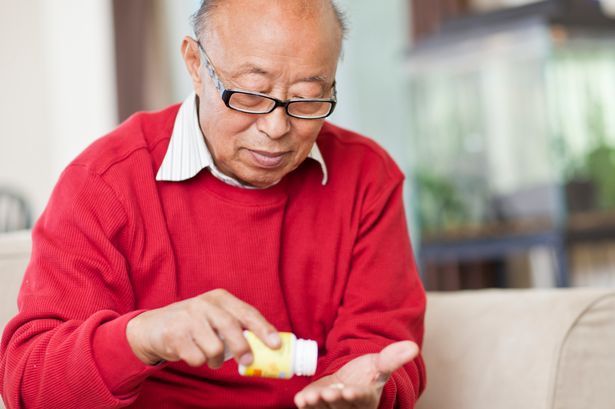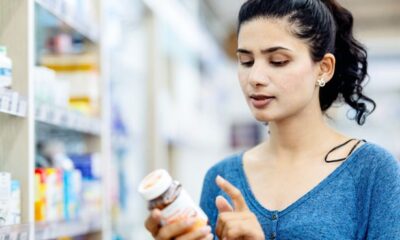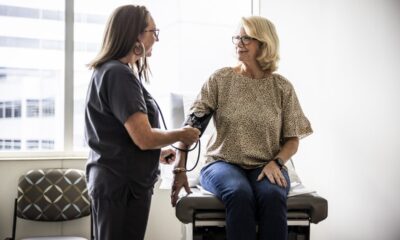Health
Pharmacist Warns Against Mixing Warfarin with Cranberry Juice

Individuals taking the anticoagulant medication **warfarin** are receiving an urgent warning about the risks associated with mixing this medication with **cranberry juice**. According to **Ian Budd**, a prescribing pharmacist at **Chemist4U**, consuming cranberry juice can significantly increase the likelihood of bleeding and bruising for patients on warfarin.
Warfarin is commonly prescribed to prevent blood clots by disrupting the body’s natural clotting process. While effective, it also makes users more susceptible to bleeding. Budd explains that cranberry juice can exacerbate this issue. He states, “Cranberry juice is often seen as a healthy choice, but it can be a problem if you’re taking warfarin. Cranberries contain natural compounds that can affect how your body breaks down warfarin, which may make the drug stronger than intended. That means your blood could become thinner, increasing the risk of bruising or bleeding.”
Guidance from Health Authorities
The **NHS** has echoed these concerns, advising individuals on warfarin to avoid cranberry juice as well as grapefruit juice. The NHS emphasizes, “Do not drink cranberry juice or grapefruit juice while you’re taking warfarin. They can increase the blood-thinning effect of warfarin.” This guidance is crucial for maintaining safety and managing potential side effects.
While Budd acknowledges that an occasional glass of cranberry juice is unlikely to cause harm, he warns against regular consumption or the use of cranberry supplements. He advises patients to consult with a healthcare professional if they have any questions regarding their medication and dietary choices. “It’s always best to check with your pharmacist before making it part of your daily routine,” he adds.
Dietary Considerations for Warfarin Users
Maintaining a balanced diet is vital for individuals on anticoagulants like warfarin. The NHS encourages a diet rich in fruits and vegetables but cautions against frequent fluctuations in the intake of foods high in **vitamin K**. Leafy greens, chickpeas, and liver can interfere with warfarin’s effectiveness. The health body states, “You can still include these in your diet while taking warfarin, as the clinic will adjust your dose accordingly, but it’s important to be consistent in the amount you eat.”
Patients are also advised to seek guidance before taking any vitamin K supplements. Additionally, caution is warranted regarding alcohol consumption. The NHS notes that alcohol can affect warfarin’s effectiveness, recommending that individuals on the medication limit their intake to one or two alcoholic drinks per day and avoid binge drinking.
In summary, those prescribed warfarin should be mindful of their diet and beverage choices, particularly avoiding cranberry juice and managing vitamin K intake. For any concerns or questions about medication interactions, individuals are encouraged to consult their general practitioner for tailored advice.
-

 Entertainment3 months ago
Entertainment3 months agoAnn Ming Reflects on ITV’s ‘I Fought the Law’ Drama
-

 Entertainment4 months ago
Entertainment4 months agoKate Garraway Sells £2 Million Home Amid Financial Struggles
-

 Health3 months ago
Health3 months agoKatie Price Faces New Health Concerns After Cancer Symptoms Resurface
-

 Entertainment3 months ago
Entertainment3 months agoCoronation Street’s Carl Webster Faces Trouble with New Affairs
-

 Entertainment3 months ago
Entertainment3 months agoWhere is Tinder Swindler Simon Leviev? Latest Updates Revealed
-

 World2 weeks ago
World2 weeks agoBailey Announces Heartbreaking Split from Rebecca After Reunion
-

 Entertainment2 weeks ago
Entertainment2 weeks agoCoronation Street Fans React as Todd Faces Heartbreaking Choice
-

 Entertainment4 months ago
Entertainment4 months agoMarkiplier Addresses AI Controversy During Livestream Response
-

 Science1 month ago
Science1 month agoBrian Cox Addresses Claims of Alien Probe in 3I/ATLAS Discovery
-

 Health5 months ago
Health5 months agoCarol Vorderman Reflects on Health Scare and Family Support
-

 Entertainment4 months ago
Entertainment4 months agoKim Cattrall Posts Cryptic Message After HBO’s Sequel Cancellation
-

 Entertainment3 months ago
Entertainment3 months agoOlivia Attwood Opens Up About Fallout with Former Best Friend




















